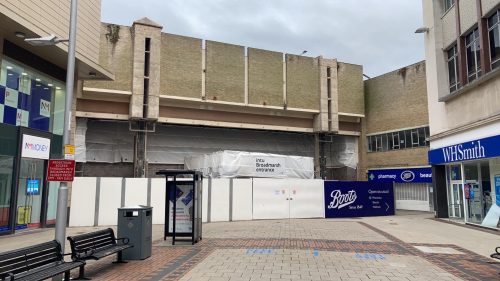City Council told to limit spend on Broadmarsh redevelopment

A failure to adopt a longer term approach to budget setting means that Nottingham City Council will have to ensure it spends as little as possible on any redevelopment of the former intu Broadmarsh shopping centre.
This is the opinion of Max Caller, the author of an independent review into the council, who says that its tendency to stick to one-year budgeting has led it to be facing a £64m black hole, which it needs to fill by 2024 if the authority is not to face bankruptcy.
The report, on behalf of Ministry of Housing, Communities and Local Government (MHCLG), says that Nottingham City Council has already lost half of the £18m it has spent so far on the Broadmarsh shopping centre site, which it was handed control of earlier this year when intu fell into administration.
It adds: “Spend to date on this element of the project is circa £18m of which approximately half is estimated to be a sunk cost.
“A full review is underway of options for the site, but it is highly likely to require significant capital investment. The Council needs to ensure that any options considered limit the extent to which they will be required to fund the project.”
Last week, an alternative proposal to “rewild” the site was put forward by Influence Landscape Architects and the Nottinghamshire Wildlife Trust.

Influence Landscape Architects’ and Nottinghamshire Wildlife Trust’s vision of how the new Broadmarsh area could look
Despite the gloomy outlook of the review, it does paint a way out of the malaise for the Council. It points to appointment of Mel Barrett, its new chief executive, as someone who “lead the organisation to meet the challenges the Council faces”, but adds: “it is not yet evident that all of the senior management below him either accept or understand the scale and pace of change and approach that is now required.”
The review says: “A fundamental culture shift is required together with a much simpler structure, working together, with clear accountability and a strong personal and collective performance management regime starting from councillors and focused through the chief executive right down the organisation.” It adds: “Both politicians and officers will need support to help them through the recovery process which will not be quick or easy.”
Yesterday, Barrett issued a statement saying: “The review team said it was impressed with the determination of the council’s leadership to stabilise the current situation and take the necessary decisions to bring about improvement.
“We hope and believe this demonstrates confidence that we can deliver the changes needed, building on the work we have already begun following the publication of the Public Interest Report in the summer.”
The next steps for the Council should be to establish, with the help of the MHCLG, a “small, focused Improvement Board” by no later than January 2021 to oversee implementation of the three-year recovery plan, meeting at least quarterly.
The review says: “The Improvement Board should be chaired by a strong, independent chair with sector experience. Members of the Board should be appointed also as non-executive directors/mentors within the Council in order to support and improve performance, as has been used to good effect recently in Birmingham City Council.
“One Member of the Board should have relevant experience in political decision taking and the Leader of the Council should be the only member of the Council on the Improvement Board.”
Responding to Caller, the leader of the council, Councillor David Mellen, said: “We have been working closely with Max Caller and his team over the last few weeks as they have carried out the review. We fully accept the findings and remain committed to making the improvements needed to ensure we are the best we possibly can be as a council.
“The review clearly raises serious issues around financial management and governance that need to be addressed urgently.
“It highlights that we have been slow to act on warnings about the risk of relying on one-off savings and income through commercialisation and that we should have been managing budgets on a longer term basis to reduce core expenditure and transform services.
“The council’s capital expenditure and high levels of debt compared to other cities is also flagged up as a major concern with the cost of borrowing restricting our flexibility on day-to-day spending.”








